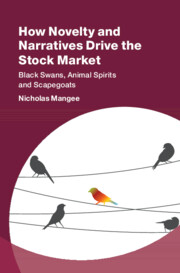Book contents
- Frontmatter
- Dedication
- Contents
- List of Figures
- List of Tables
- Preface
- Acknowledgments
- PART I NOVELTY, NARRATIVES, AND INSTABILITY
- PART II NEWS ANALYTICS AS A WINDOW INTO STOCK MARKET INSTABILITY
- PART III EMPIRICAL EVIDENCE FOR THE NOVELTY-NARRATIVE HYPOTHESIS
- 9 Corporate Novelty and Stock Market Outcomes
- 10 Narrative Intensity and Stock Market Instability
- 11 A Manual Novelty-Narrative Scapegoat Analysis
- 12 Applying Novelty and Narratives to Other Research
- 13 The Future of Novelty, Narratives, and Uncertainty in Finance
- 14 Concluding Thoughts and Future Research
- Appendix A R Code for Bloomberg News Word Cloud and Histogram
- Appendix B The Bloomberg News KU Stock Market Project
- Appendix C RavenPack Terms for Event Output Record
- Appendix D Unscheduled Events from RavenPack
- Bibliography
- Index
11 - A Manual Novelty-Narrative Scapegoat Analysis
from PART III - EMPIRICAL EVIDENCE FOR THE NOVELTY-NARRATIVE HYPOTHESIS
Published online by Cambridge University Press: 23 September 2021
- Frontmatter
- Dedication
- Contents
- List of Figures
- List of Tables
- Preface
- Acknowledgments
- PART I NOVELTY, NARRATIVES, AND INSTABILITY
- PART II NEWS ANALYTICS AS A WINDOW INTO STOCK MARKET INSTABILITY
- PART III EMPIRICAL EVIDENCE FOR THE NOVELTY-NARRATIVE HYPOTHESIS
- 9 Corporate Novelty and Stock Market Outcomes
- 10 Narrative Intensity and Stock Market Instability
- 11 A Manual Novelty-Narrative Scapegoat Analysis
- 12 Applying Novelty and Narratives to Other Research
- 13 The Future of Novelty, Narratives, and Uncertainty in Finance
- 14 Concluding Thoughts and Future Research
- Appendix A R Code for Bloomberg News Word Cloud and Histogram
- Appendix B The Bloomberg News KU Stock Market Project
- Appendix C RavenPack Terms for Event Output Record
- Appendix D Unscheduled Events from RavenPack
- Bibliography
- Index
Summary
This chapter applies a manual textual analysis of scapegoat effects in the stock market under the Novelty–Narrative Hypothesis. Information contained in Bloomberg News daily market wrap reports proxy for the story-weights investors place on observable and unobservable micro and macro fundamentals. Findings of dramatic variation in the narrative-based attention investors place across particular fundamentals suggests instability, in both frequency and magnitude, characterizing their forecasting strategies of future stock market outcomes. Time-varying properties of the narratives are found to be connected to shifts in the underlying variables particularly level- and gap-effects. Evidence suggests that adding narrative dynamics as proxied by scapegoat effects to benchmark macro-finance models improves fundamentals' ability to explain stock price fluctuations under uncertainty. Measures of model fit and forecasting accuracy provide the most empirical support for varying-coefficient scapegoat models based on micro and macro novel events and narrative effects, or attention-weights, attached to fundamentals.
- Type
- Chapter
- Information
- How Novelty and Narratives Drive the Stock MarketBlack Swans, Animal Spirits and Scapegoats, pp. 265 - 294Publisher: Cambridge University PressPrint publication year: 2021

